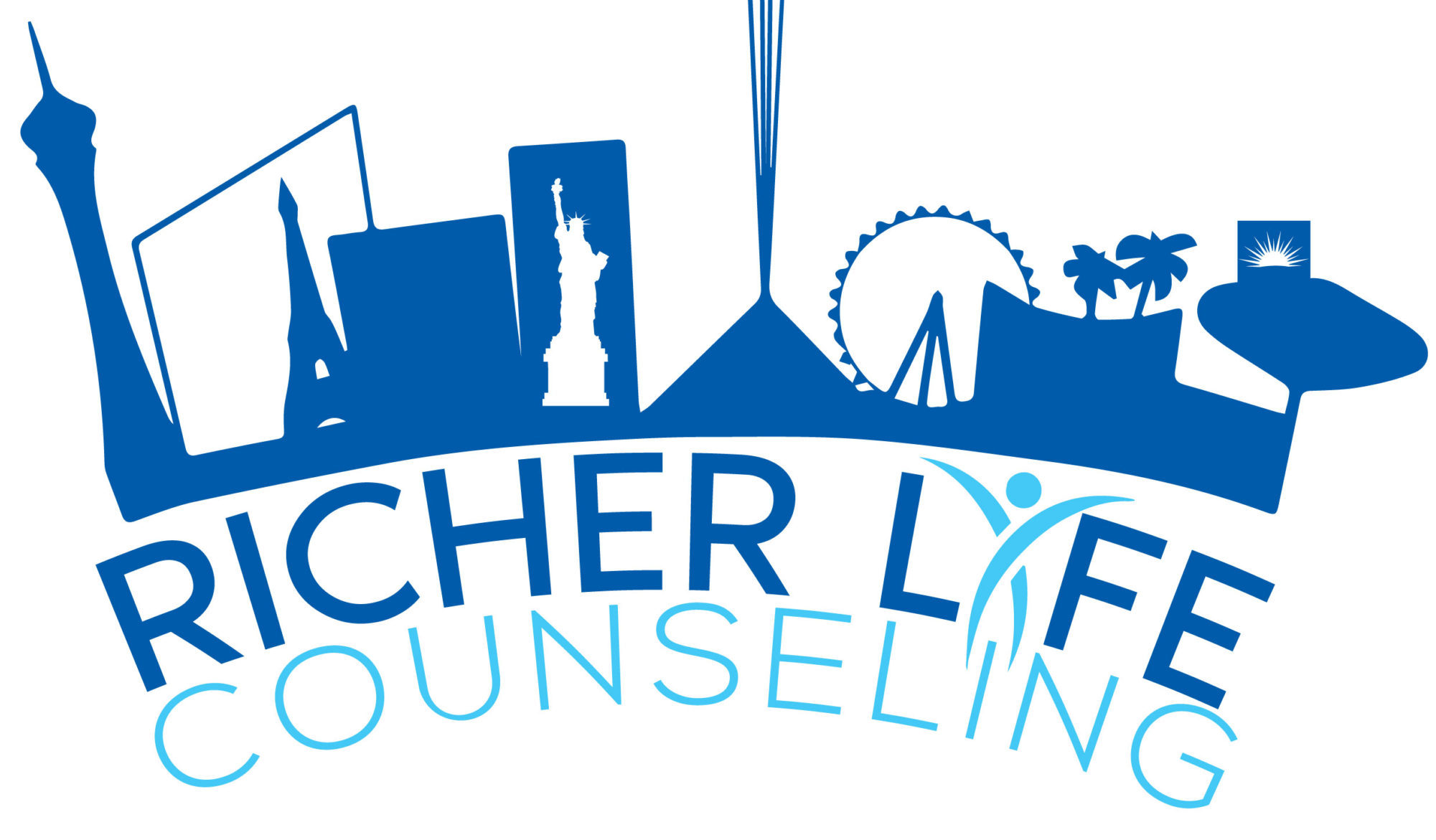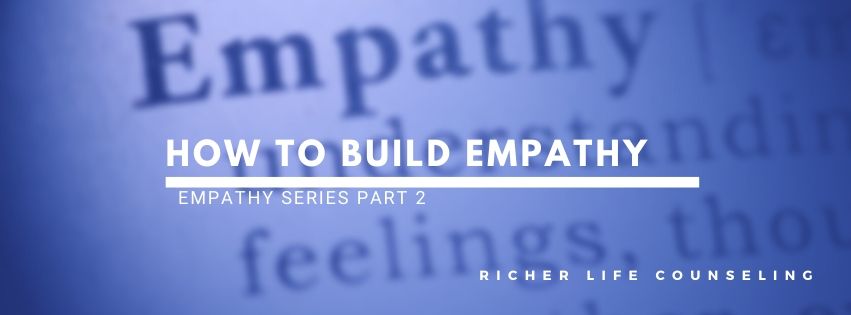Empathy Series Part 2
Part 2 of our empathy series: Make sure you read part one first before diving into this article on how to build empathy. In our last article, we talked about what is happening in the brain and why developing empathy is essential. In this article, I will share the different parts of empathy and how to build empathy.
Perspective IS everything!

The first thing to know is that how you are feeling matters so much as to whether you can be empathic or not. When you are in an agreeable or comfortable situation, it is easier to be empathetic. Because empathy requires you to use your own emotions as a reference point, you must be in a neutral state or the same state as the person with whom you are trying to be empathic.
This means when your partner is scared about losing their job, you might be able to be empathic because you are also scared about them losing their job.
If you are not in a neutral emotional state or the same state, then you might tend self-centeredness. This will mean you don’t have the ability at the moment to connect to your partner’s discomfort.
Types of Empathy
To develop the skills of being an empathic person, you need to understand that empathy shows up in 3 different ways: cognitive empathy, emotional empathy, and compassionate empathy. To answer the question on how to build empathy, you must understand, and be able to experience and express all three forms of empathy.
Cognitive Empathy
This form of empathy is the one that I have found most people get the easiest. Even if you are emotionally unaware, you will be able to express cognitive empathy. This is when you can take the perspective of the other person. You can put yourself in their shoes and see the world through their perspective. This is logical thinking about their feelings, not feeling it. Someone expressing cognitive empathy is someone who can just state the sentiment the other person is expressing.
“I can see how scary losing your job could be.”
Emotional Empathy
This is the type of empathy when you look deep within your own life experience and feel the other person’s emotions with them. It is like you caught their feelings, they feel sad, so you feel sad. This is what most people think of when they think of empathy. This has a good and a bad side.

It’s good because when you can feel what other people feel, then you can connect deeply with them. You are able to understand what they are going through. This also lets you have the ability to respond quickly because you just get it. This is what my clients experience in therapy most of the time; I get what they are feeling swiftly, and it’s very comforting.
However, if you always feel what other people feel, you might take it on to rescue them. This can be emotionally draining, and possibly danger yourself cause you to feel out of control of your own emotions. You can experience empathy overload meaning that you feel so much for someone else that it will cause you so much emotional turmoil you will disconnect from them.
Compassionate Empathy
When you can be fully present with someone else, you are not caught up in logic or your emotional response. You show more in-depth levels of understanding and are just listening to your partner, not trying to solve any problems, just offering space and support.
How To Develop Empathy
To develop more profound empathy and connection, you must learn to develop all 3 aspects of empathy I listed above.
Road Blocks to Empathy
Not paying attention
When you aren’t paying attention, you can’t connect. The connection only comes when you make eye contact, slow down, and speak slowly. When you aren’t looking at each other, it’s hard to get your mirror neurons to kick in.
Hiding Vulnerability
When you are hiding part of yourself, for whatever reason, it will keep you from truly connecting. Check out our article on vulnerability.
Intellectualizing
This is when you just try to fix the problem. Intellectualizing is more than just fixing and is sometimes making the problem all about the content/context of the situation. Intellectualizing means you are not paying attention to the emotion.
Self Development
You must learn to identify your feelings. If you don’t know how you are feeling, how are you going to connect to someone else? As we learned in this series, if you are not emotionally neutral, you can’t be empathic. You can’t be emotionally natural if you don’t know what you are feeling.
Self-developing Action Step
- Daily meditation
- Journaling
- Checking in daily with what you are feeling (throughout the day)
- Physically exercising – This can help you connect to being uncomfortable yourself, thus making it easier to show up for others who are uncomfortable.
Build Connections
Check-in with your kids, co-workers, friends and especially your partner. Develop a deep curiosity about others, seeing them as unique. Look for what things you have in common with the people in your life. What would it be like if you experienced what they experienced? How would you react? Building connections is about listening, hearing, and paying attention.
Action steps to take to build connections
- Check-in with people. Ask what’s really going on, not just “how are you doing?” Go deeper. Remember something they told you about last time and talk about that.
- Share your stuff with them. “What are you excited about?” “What has meaning to you?” This is more than just talking about the weather, kids, or sports. This is talking about something that has a deeper meaning to you.
- Full attention – Put the phone down. Turn the TV off. Make eye contact. Face-to-face communication is always the best, but if you can’t do that, use Facetime, followed by phone. TEXT message is never a substitute for a deeper connection.
Meaning
Developing meaning is a way for you to provide understanding of what someone else is going through. This means you are not judging what is a benign share in any way. You are not saying look on the bright side. You are looking and asking yourself, “what is the deeper raw feeling that is being shared?”

Actions steps to developing meaning
- Say things like, “I just don’t know what to say right now, but I am so glad you told me.”
- Stay away from fixing it
- Recognize your own feelings
- Be aware of the past and stay away from the comparison of your response to your partner’s response. There is a time and a place for that.
- How to hold space for your partner: This is what Brene Brown talks about in her video on empathy. Holding space means you are showing up for your partner, even when it’s hard. Just listen, be comforting, even saying, “I don’t know what to say, but I am glad you told me.”
Action
Being proactive with relationships in your life. When you are able to take a daily small action to be connected, showing empathy is easier because you know when to show up. Action is about focusing on someone else, thinking about the relationships in your life as living things that must be cared for. Think of going the extra mile with bonding activities.
Actions steps for action
- Go to therapy
- Read books about relationships together
- Do activities (even dates) that focus on closeness and shared expressions
- Take time every day to talk about something deeper
Warning!
Building empathy is about both partners making the relationship better no matter what type of relationship. If one partner is not talking or showing the same positive steps in building connections, you need to have strong boundaries.
“When I sacrifice my rights, I give other permission to mistreat me.”
Just because you are empathic doesn’t mean you need to give up your own emotional needs and wants. You need to be proactive in understanding your own needs and learning to love to ask for them to get met. Remember, empathy is about connection, NOT about getting what you want.
If you or your relationship struggles with empathy, I hope this empathy series has helped you start to see ways to improve. If you have questions about empathy, leave them in the comments below. If you think it’s time to build better empathy and you live in Nevada, please contact us below to start to develop healthier empathy.
Contact us today by calling or texting 702-518-1546, email, or booking a session by hitting the appointment request button. We can normally get you into a session within 24 or 48 hours.
We offer both online therapy (learn more about online therapy here) and in-person therapy at our Las Vegas office. Our office is located in West Las Vegas right off the 95 & Rainbow. Our address is 222 S. Rainbow Boulevard | Suites 113-114 |Las Vegas NV 89145
- Table Topics - June 25, 2020
- How to Apologize - June 11, 2020
- What is stonewalling? |TheRicher Marriage Show - June 5, 2020

